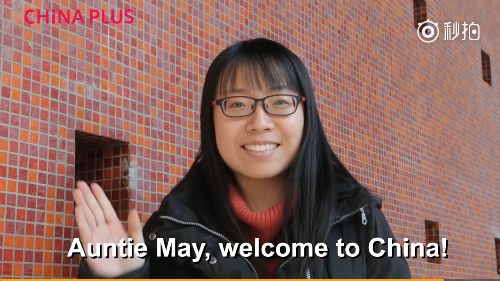Chinese media enthuse about arrival of 'Auntie May'
- Published

Chinese media and social media have been showing their excitement over the PM's arrival
Chinese state media are rolling out the red carpet for British Prime Minister Theresa May as she embarks on a three-day trade mission.
Outlets have nicknamed her "Auntie May" - an affectionate form of lingo that is usually reserved for key allies of Beijing.
State media say the visit shows Sino-UK relations are moving in a positive direction, and they are optimistic about future trade relations and cultural exchanges.
Mrs May will hold trade and investment talks with President Xi Jinping and Premier Li Keqiang. She is currently in Beijing after a short stopover in the central city of Wuhan, and she will also go to the economic powerhouse of Shanghai.
'May eyes China'
The headline of high-circulation Reference News promises "the escalation" of Sino-British relations
Many of China's influential newspapers are giving prominent coverage to the visit.
Reference News, which has a huge distribution in China, carries the headline: "British Prime Minister visits China to boost the 'Golden Era'."
The phrase "Golden Era" was coined during President Xi's first state visit to the UK in October 2015, when David Cameron was prime minister. It has been used repeatedly by Prime Minister May and President Xi to emphasise that bilateral relations have gone from strength to strength.
Nationalist paper Global Times hints that China will become a new ally for post-Brexit Britain
China can benefit from increased trade once Britain leaves the EU, says the English-language edition of state-run newspaper Global Times on its front page.
It carries the headline: "May eyes China after Brexit", and says her trip indicates that Beijing "will become increasingly important in post-Brexit Europe".
'Auntie May'
Many Chinese students spoke of their love and admiration for "Auntie May"
State media tend to use formal language when reporting on foreign dignitaries, so it is notable that they are using the affectionate term "Auntie May" when referring to Mrs May.
China Plus, a state-run English-language website, says the moniker has been coined "by the younger generation who are fond of British culture".
But given that the family unit is venerated in Chinese society, the use of the word "auntie" suggests that Beijing holds Mrs May in great respect.
Official news agency Xinhua lauds "Auntie May's arrival" on its social media accounts, and state broadcaster CCTV similarly welcomes the arrival of "Auntie May".
A China Plus video, external has been widely shared on leading social media platform Sina Weibo. It shows students explaining why they are fans of "Auntie May".
One of them praises her for not being "a stereotype of a female politician", and for "having a good sense of fashion", adding "she loves leopard print!"
Another says she has made "great efforts" to tackle terrorism and deal with Brexit.
'The First Gentleman'
Media and social media users have anticipated the arrival of "The First Gentleman"
Although Mrs May has visited China before, media have been eagerly anticipating the appearance in the mainland of "The First Gentleman", with CCTV, external noting this is the first time Philip May has accompanied the prime minister on a trip to China.
The Xinhua News Agency, external says "like most female leaders' spouses, the 'First Gentleman' is known for his modesty," and popular news website The Paper, external notes that he is "very low-key, stays away from the media and the public eye".
Both outlets have written extensive biographies on Philip May, and laud the support he provides to his wife.
A 31 January article says it is "unfortunate" that the two were unable to have children, but says "What is most important is that for 40 years he has been by her side, loved her, supported her and defended her."
The Paper describes how their first meeting at a ball was "love at first sight" and says "the support he gives to his wife will make her 'the next Margaret Thatcher'."
Users of the popular Sina Weibo microblog comment that he is "a very handsome gentleman" and that their relationship is "really beautiful".
Speculation over Hong Kong
Theresa May has said she plans to discuss human rights and Hong Kong with President Xi
Chinese social media users are commenting with warmth about Mrs May's visit.
During her visit to Wuhan, Weibo users enthused over her visit to the landmark Yellow Crane Tower, external and Wuhan University, and her experiencing traditional Beijing Opera.
Many also said that they hoped she would get to experience traditional "Reganmian, external", a spicy noodle dish that Wuhan is famous for.
Users in Beijing and Shanghai say that they look forward to warmly welcoming "Auntie May" to their cities.
But some are looking ahead to Mrs May's meeting with President Xi, and saying that hope discussions about Hong Kong will come up.
Theresa May has pledged to raise Hong Kong and human rights with President Xi, but some mainland-based Weibo users say they hope she will "make clear" her views on democracy in Hong Kong.
One says they hope she will "publicly denounce Hong Kong separatists".
But another says that if she raises the subject, she should "turn around and go to Hong Kong," rather than continue her visit.
BBC Monitoring, external reports and analyses news from TV, radio, web and print media around the world. You can follow BBC Monitoring on Twitter, external and Facebook, external.